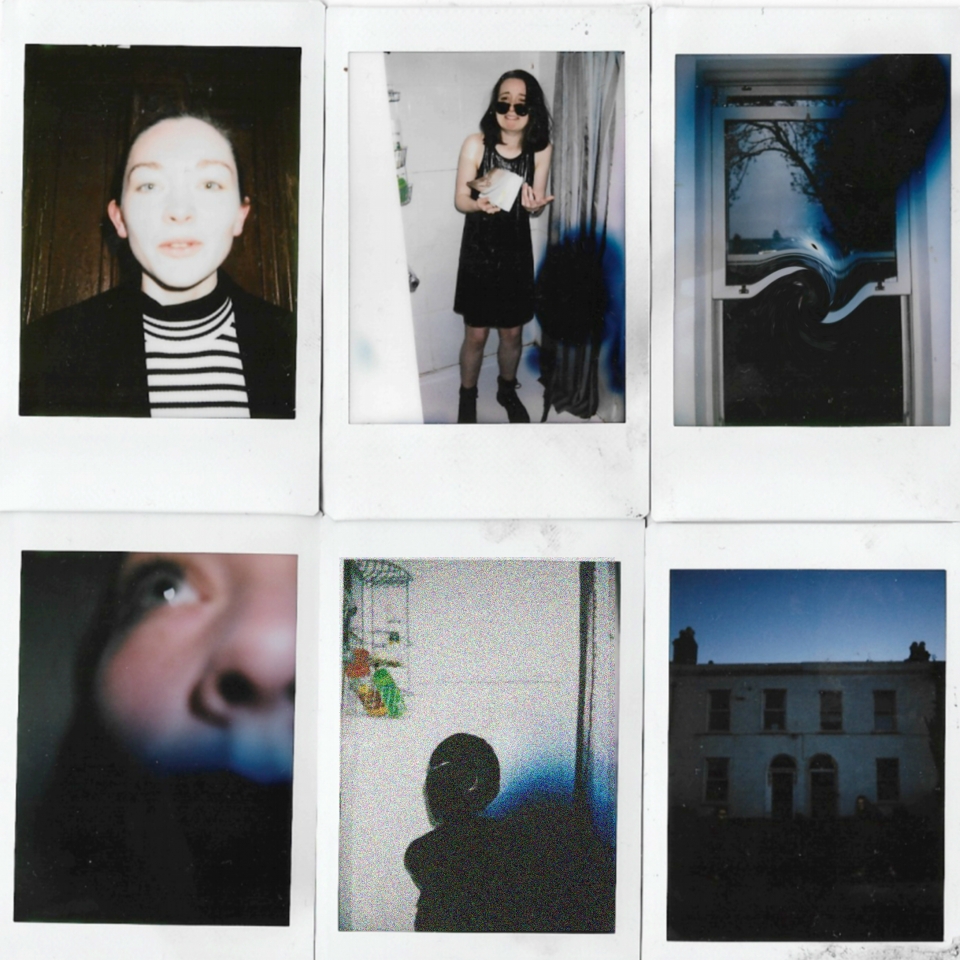
The captivating mystery of a black box is that all eyes are drawn to what lies inside. It sits onstage, eager to unravel its weird and dark secrets. Inside this black box is the elusive and strange world of Papini. Staged as part of the Dublin Fringe Festival in the Smock Alley, Papini delves into what can only be described as the disorientating and turbulent realm of the human mind. Without question, this is a brave place to go. Written by Colm Gleeson and directed by Colm Summers, Papini pulls you down the rabbit hole. It excitedly wraps you up in the sense of loss and pain that haunts the students Val, Claude, Mongrel and Andy. One moment you’re tearing up at the unrelenting torment of depression and the next you’re laughing about the exact same thing. This is the way of Papini.
The show is simply designed. Strange celestial images are projected onto a white sheet behind nothing more than two beds and a black box. It’s a practical but effective space that wields an unsettling presence. My initial thought was that more could have been done with the set. It quickly dawned on me, however, that the ambition and the power of this play is to be found in the writing. The space is simple so as not to overly distract the viewer from the delicate discoveries stitched across Gleeson’s dialogue. With that said, throughout the show, the projection is used to a wonderfully eerie effect, showing the stark, ghostly face of Papini, as if present and yet not. The disorientating flashing of lights and the occasional echoing of the dialogue occur at just the right moments to remind you that this is not taking place in the rational realm of reality. We are invited to believe in magic, and it becomes disturbingly apparent that we can understand it about as much as certain mental health issues.
As the characters struggle to make sense of their own grievances, the character Papini seems at first to linger in the invisible and the unknown. He is a figure of fear. The fear that we don’t understand the very world we live in. It’s this ability to present a character who seems to inhabit the subconscious, fearful mind that initially renders the viewer wide eyed and silent. Hearing the story of Claude’s brother disappearing at the hand of Papini at the beginning is enough to make you hope you never encounter this mad magical monster.
Papini opens like a tragic missing person’s case, and this tone remains until we are gifted with the undeniably likeable performance of Eavan Gaffney as Val. Suddenly, the sense of this world changes and you find yourself laughing. Gaffney sits there, clutching a knife, frustrated at the difficulty that is self harm and you’re quite genuinely laughing despite yourself. For these moments, you forget the fear and the heartbreak of Claude and Mongrel, and you chuckle at Gleeson’s very accurate and honest representation of depression. Cleverly, all initial stigmas and preconceptions about mental health are avoided by simply calling her depression “it”. This allows the audience to play with Gaffney and explore the compulsions that are common to mental health issues without judgement or fear.
Like the character of Papini, these issues are at their most effective when they are presented with subtlety and mystery. It’s a challenge for many artists to represent mental health in a way that is non-judgmental and yet removed from glorification. Papini treads this fine line with care, intelligence and honesty. You laugh with Val’s ridiculous projects but she manages to make you hope that things will get better. This sense of hope for all of the characters guides you through the performance. There’s always a chance that Claude’s brother will reappear, that Val will get through “it” and Mongrel will move past the tragedy that occurred in her summer.
Through sensitive and authentic writing, Papini demands that you are invested in the outcomes of the characters’ lives. The powerful performances from the cast enrich each individual narrative with a delightfully charming gravitas. The weird and wonderful mystery of the magician Papini is at first alluring, but the show is at its strongest when it plays out the day-to-day events like an oddly endearing and poignant sitcom.
As the drama continues, however, there is a danger of the play becoming heavy handed in its portrayal of the fantastical. The magic lies in the question, the unknown and the dark. It seems like, towards the end, the lights are raised when we are presented with the admittedly disturbing and impressive Papini.
When Papini is invisible, when he is fear, when he is loss, when he is “it”, Summers’s direction is truly powerful and intriguing. However, when Papini appears and opens his mouth, it seems as though the contents of the black box are exposed. As the show continues, the representation of mental health loses some of its clarity and becomes less effective. The intrigue of the story is lessened as it loosens its grip upon reality. Yet the performances from all the cast fill the narrative with likeability and relatability. The combination of Gleeson’s writing with Summers’s charming and often bizarre direction makes for a very likeable, important and memorable piece of theatre. Both its tone and its style are very informed and enjoyable. The beauty of the black box is that we don’t know what’s inside. Arguably, Papini reveals too much to maintain its constant intrigue. The magical energy that emanates from this show, however, certainly makes up for it.
Papini is being performed on September 22nd at 9pm and September 23rd at 3pm and 9pm in the Smock Alley Black Box Theatre. Tickets and more information are available at the Fringe Festival website.






